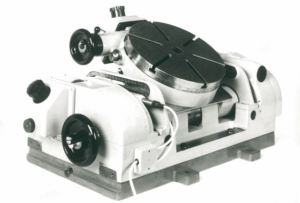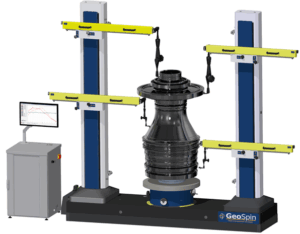Much like the market-leading rotary measurement solutions it designs, develops and manufactures, RPI is highly specialised. A provider of more than 3,000 precision devices since it was established, the company’s niche expertise have seen it capitalise on emerging markets and expand across the globe.
Launched in the tumultuous 1940s, RPI largely produced metrology equipment in its early years, as well as manufacturing various other products required for the Second World War. From this platform, the organisation was able to forge a lucrative partnership with Rolls Royce, and the British manufacturer remains a key customer for RPI to this very day. These foundational successes eventually saw the firm acquired by an external investor, before being re-purchased in 2011 and returning to its roots as a family-run business.
In the early 2010s, previous efforts to diversify RPI’s product range had left the business lacking a clear vision for the future – but all that was about to change. When the firm’s current Managing Director Peter Marchbank joined RPI in 2015, he worked with his team to restore the historic company’s core identity.
“One of the biggest dangers for a small business is to lack focus,” Peter begins. “When I joined RPI, we decided to revert our focus back to the metrology sector because it was something we were really good at, and it was a sector where we had the best relationships.”
A Reputation for Excellence
Peter’s aim was to grow the business. His strategy was simple and involved three core tenets: product development, global market penetration, and operational excellence. The approach quickly paid off and RPI soon saw growth of up to 60% – right up until 2020 and the emergence of Covid-19. Just as the future was looking bright, the pandemic offered another twist in RPI’s tale.
“The majority of our business was aerospace-related,” Peter reveals, “so Covid had a major impact on our work, and much of it came to a grinding halt. However, we took that time to further advance a lot of our R&D. We really studied the market, and we bounced back.”

Following the pandemic, demand for aircraft production increased drastically, but RPI was ready to service the aerospace market’s demand. One reason why the company has become such a reliable partner for aerospace is due to in-house systems with built-in regulation that ensure RPI always meets the industry’s exacting safety requirements.
“When we climb onto an aeroplane, we want to feel safe,” Peter says. “By employing standards like ISO 9001 compliance, we calibrate everything to an international standard. All our work, instructions, procedures, and methods are based on industry regulations.”
The aerospace sector remains RPI’s main focus, and the company continues to serve major international OEMs and MROs. Elsewhere, the rise of the Internet of Things has seen RPI drawing demand from large data centres.
“We are now starting to see opportunities across numerous markets,” Peter reports. “Power generation requirements have stimulated demand for a lot of our equipment with the likes of General Electric, and this has been further complemented by the rise of AI.”
After a record-breaking 2024, RPI has started 2025 with an order book already equal to the previous year’s increased turnover. As the clamour for the company’s products continues, a central challenge for RPI is to find a way to service the rising demand.
“We are very purposeful when it comes to making sure we can meet demand,” Peter remarks. “We are constantly looking at inefficiencies and how we can eliminate, and improve upon, these to create more capacity. Since the pandemic, we have looked long and hard at areas like procurement, stocking, and value engineering, which has helped set us up for the future.”
Natural Progression
When it comes to the future Peter mentions, there is one dominant theme – the importance of acquiring and retaining the very best talent. For a company like RPI, where specialist expertise and engineering experience are often essential, the recruitment challenge is not always easy. To overcome this obstacle, RPI decided to reassess and take a different, more people-centred approach to hiring.
“The culture of our organisation is to get the best out of people, so when we hire, we’re not always looking for somebody to hit the ground running,” Peter explains. “We want to develop our team and create an environment where they want to stay and grow with us.
“RPI is not reliant on one person. I couldn’t do this job without my management team. Ultimately, by developing people, we can create a natural plan of progression for years to come.”
Alongside training and development, increased workplace flexibility and a highly competitive renumeration package have seen RPI become an employer-of-choice in a clustered sector. Harnessing its talented workforce, industry knowledge, and innovative engineering capabilities, the organisation is now looking to maximise its potential across the decade ahead.
“Our core business remains the same, but we are now looking at whether our technology can benefit new potential customers or industries,” Peter says. “We’re not straying from our priorities, but we have been spending quite a lot of our R&D time investigating these new markets and developing the right strategy.”

Global Penetration
RPI’s history affirms that the company is not afraid to adapt, but the past has also taught the organisation that transformative growth does not require change for change’s sake. As the company expands into new locations and emerging markets, it is determined to stay true to its specialism.
“We have this strong reputation, which has eased growth, but even in new markets with short sale cycles – companies selling micrometers and verniers, for example – we remain very specialist,” Peter confirms.
“Geographically, we have enjoyed significant penetration in the American market, as well as expansion in Asia too. We are growing relationships in these locations as we learn to operate in new business cultures, but crucially, from a philosophical standpoint, we are sticking to our guns of being niche and delivering on our clearly defined USP.”




